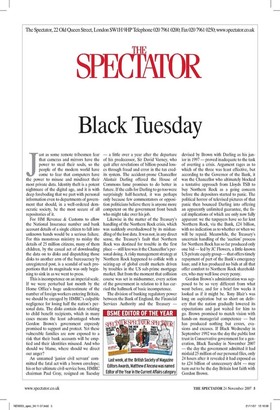Black Tuesday
Just as some remote tribesmen fear that cameras and mirrors have the power to steal their souls, so the people of the modern world have come to fear that computers have the power to misuse and misdirect their most private data. Identity theft is a potent nightmare of the digital age, and it is with deep foreboding that we part with personal information even to departments of government that should, in a well-ordered democratic society, be the most secure of all repositories of it.
For HM Revenue & Customs to allow the National Insurance number and bank account details of a single citizen to fall into unknown hands would be a serious failure. For this monstrous ministry to mislay the details of 25 million citizens, many of them children, by the casual act of downloading the data on to disks and dispatching those disks to another arm of the bureaucracy by unregistered post, is a scandal of such proportions that its magnitude was only beginning to sink in as we went to press.
This is incompetence on an imperial scale. If we were perturbed last month by the Home Office's huge underestimate of the number of foreign workers entering Britain, we should be enraged by HMRC's culpable negligence for losing half the nation's personal data. The disks contain data relating to child benefit recipients, which in many cases means the least advantaged whom Gordon Brown's government expressly promised to support and protect. Yet these vulnerable families are now exposed to a risk that their bank accounts will be emptied and their identities misused. And who should we blame, where should we direct our anger?
An unnamed 'junior civil servant' committed the fatal act with a brown envelope; his or her ultimate civil-service boss, HMRC chairman Paul Gray, resigned on Tuesday — a little over a year after the departure of his predecessor, Sir David Varney, who quit after revelations of billion-pound losses through fraud and error in the tax credits system. The accident-prone Chancellor Alastair Darling offered the House of Commons lame promises to do better in future. If the calls for Darling to go too were surprisingly half-hearted, it was perhaps only because few commentators or opposition politicians believe there is anyone more competent on the government front bench who might take over his job.
Likewise in the matter of the Treasury's handling of the Northern Rock crisis, which was suddenly overshadowed by its mishandling of the lost data. It was not, in any direct sense, the Treasury's fault that Northern Rock was destined for trouble in the first place — still less was it the Chancellor's personal doing. A risky management strategy at Northern Rock happened to collide with a seizing-up of global credit markets driven by troubles in the US sub-prime mortgage market. But from the moment that collision course was set in midsummer, every action of the government in relation to it has carried the hallmark of basic incompetence.
The division of banking regulatory power between the Bank of England, the Financial Services Authority and the Treasury — devised by Brown with Darling as his junior in 1997 — proved inadequate to the task of averting a crisis. Argument rages as to which of the three was least effective, but according to the Governor of the Bank, it was the Chancellor who ultimately blocked a tentative approach from Lloyds TSB to buy Northern Rock as a going concern before the depositors started to panic. The political horror of televised pictures of that panic then bounced Darling into offering an apparently unlimited guarantee, the fiscal implications of which are only now fully apparent: we the taxpayers have so far lent Northern Rock, via the Bank, £24 billion, with no indication as to whether or when we will be repaid. Meanwhile, the Treasury's uncertain handling of the 'auction' process for Northern Rock has so far produced only one bid — led by JC Flowers, a little-known US private equity group — that offers timely repayment of part of the Bank's emergency loan; and it has produced no bids at all that offer comfort to Northern Rock shareholders, who may well lose every penny.
Gordon Brown's administration was supposed to be so very different from what went before, and for a brief few weeks it looked as if it might be. Tony Blair's was long on aspiration but so short on delivery that the nation gradually lowered its expectations and just waited for him to go. Brown promised to match vision with hands-on managerial competence — but has produced nothing but errors, evasions and excuses. If Black Wednesday in September 1992 was the day the public lost trust in Conservative government for a generation, Black Tuesday in November 2007 — the day the government admitted it had mislaid 25 million of our personal files, only 24 hours after it revealed it had exposed us to £24 billion of unnecessary debt — may turn out to be the day Britain lost faith with Gordon Brown.






































































 Previous page
Previous page